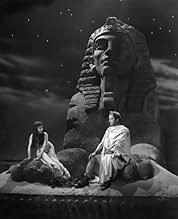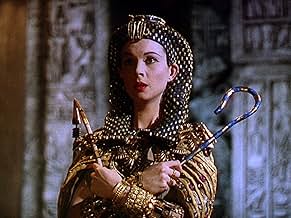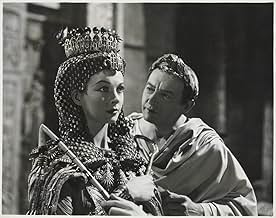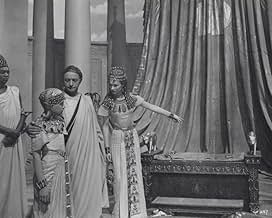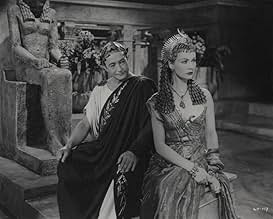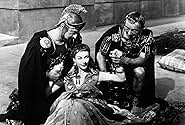CALIFICACIÓN DE IMDb
6.2/10
3.3 k
TU CALIFICACIÓN
En el apogeo de la Guerra Civil Romana, una joven Cleopatra conoce a un Julio César de mediana edad, quien le enseña cómo gobernar Egipto.En el apogeo de la Guerra Civil Romana, una joven Cleopatra conoce a un Julio César de mediana edad, quien le enseña cómo gobernar Egipto.En el apogeo de la Guerra Civil Romana, una joven Cleopatra conoce a un Julio César de mediana edad, quien le enseña cómo gobernar Egipto.
- Nominado a 1 premio Óscar
- 2 nominaciones en total
Anthony Eustrel
- Achillas
- (as Antony Eustrel)
James McKechnie
- 2nd. Centurion
- (as James Mc Kechnie)
Opiniones destacadas
Impressive acting is the highlight of 1945's "Caesar and Cleopatra," a British production starring Vivien Leigh, Claude Rains, Stewart Granger, Flora Robson and Francis L. Sullivan. In smaller roles, you can spot Michael Rennie, Kay Kendall and Jean Simmons.
This production was not without its problems - made during World War II, bombings often delayed the filming; there was a five-week break while Vivien Leigh recovered from a miscarriage; and there was a shortage of materials to build the sets. Nevertheless, for a British film, this is a real spectacle and made in color, which was also unusual back then.
Shaw's Cleopatra (Leigh) is a childlike girl/woman who has hitting matches with her younger brother, runs, giggles, talks fast and becomes nervous at the thought of meeting the great Caesar (Rains). In the beginning, she meets him without realizing it.
The two have a flirtation while he teaches her how to be a queen. Shaw's Caesar is an old man, a great warrior and a benevolent ruler who rules with a velvet glove rather than a sword.
Rains and Leigh are wonderful in their roles. Rains, as someone stated, with his Caesar haircut, weary face and beautiful profile looks as if he stepped out of that time period. His mastery of Shaw's language is magnificent, and he really holds the film together.
The stunningly beautiful Leigh, white-faced with glorious cheekbones and dazzling eyes, is a whimsical Cleopatra at first. She matures and becomes calmer and more regal as she learns how to be a queen, but she falls back into her childish ways in the presence of Caesar, particularly when he promises to send her Marc Anthony.
They say the camera adds 10 pounds - frankly, I'm surprised any of the actors could see Leigh, she is so tiny. She gives a sprightly, energetic performance.
Shaw's Cleopatra is 16 (though in reality she is 20 or 21) - Leigh was 32 at the time of filming and comes off like the teenager Shaw wrote.
Stewart Granger as Apollodorus shows off his very hunky physique - no wonder he came to the attention of Hollywood. As two aides of Caesar's, Basil Sydney as Ruffio and Cecil Parker as Britanus give fine performances.
Finally, Flora Robson as the protective, tough nursemaid of Cleopatra's, Ftatateeta, sinks her teeth into the role and is a force to contend with.
This movie flopped, probably because audiences thought it was going to be some huge spectacle - it's big for England, but it's not DeMille.
Still, it's a real treat to see one of the classics done by two great actors who were well-trained and well-equipped to perform George Bernard Shaw.
This production was not without its problems - made during World War II, bombings often delayed the filming; there was a five-week break while Vivien Leigh recovered from a miscarriage; and there was a shortage of materials to build the sets. Nevertheless, for a British film, this is a real spectacle and made in color, which was also unusual back then.
Shaw's Cleopatra (Leigh) is a childlike girl/woman who has hitting matches with her younger brother, runs, giggles, talks fast and becomes nervous at the thought of meeting the great Caesar (Rains). In the beginning, she meets him without realizing it.
The two have a flirtation while he teaches her how to be a queen. Shaw's Caesar is an old man, a great warrior and a benevolent ruler who rules with a velvet glove rather than a sword.
Rains and Leigh are wonderful in their roles. Rains, as someone stated, with his Caesar haircut, weary face and beautiful profile looks as if he stepped out of that time period. His mastery of Shaw's language is magnificent, and he really holds the film together.
The stunningly beautiful Leigh, white-faced with glorious cheekbones and dazzling eyes, is a whimsical Cleopatra at first. She matures and becomes calmer and more regal as she learns how to be a queen, but she falls back into her childish ways in the presence of Caesar, particularly when he promises to send her Marc Anthony.
They say the camera adds 10 pounds - frankly, I'm surprised any of the actors could see Leigh, she is so tiny. She gives a sprightly, energetic performance.
Shaw's Cleopatra is 16 (though in reality she is 20 or 21) - Leigh was 32 at the time of filming and comes off like the teenager Shaw wrote.
Stewart Granger as Apollodorus shows off his very hunky physique - no wonder he came to the attention of Hollywood. As two aides of Caesar's, Basil Sydney as Ruffio and Cecil Parker as Britanus give fine performances.
Finally, Flora Robson as the protective, tough nursemaid of Cleopatra's, Ftatateeta, sinks her teeth into the role and is a force to contend with.
This movie flopped, probably because audiences thought it was going to be some huge spectacle - it's big for England, but it's not DeMille.
Still, it's a real treat to see one of the classics done by two great actors who were well-trained and well-equipped to perform George Bernard Shaw.
Up to the time it was released in 1945 Caesar and Cleopatra was the most expensive British film ever made. It was as though the British cinema was trying to show America it could do a DeMille like epic as good as Cecil B. DeMille or anyone else from Hollywood. It may have been a little too overdone. Director Gabriel Pascal might have gotten a bit carried away with the spectacle and the audience might well have missed some of George Bernard Shaw's inspired dialog.
And Pascal had the advantage of the aged Mr. Shaw personally supervising the production. Of course Shaw insisted on total fidelity to his play and the ideas therein. I understand that J. Arthur Rank wanted to have a little sex and romance in there, like DeMille did do, but Shaw would have none of it.
What sets Caesar and Cleopatra apart from other Cleopatra stories that starred Theda Bara, Elizabeth Taylor, and Claudette Colbert is that Shaw portrayed her as probably what she was, a silly teenager who just happens to be Queen of Egypt. There's a little bit of Scarlett O'Hara in Vivien Leigh's performance as she moves from silly teen to a young women well schooled in statecraft by Julius Caesar.
Claude Rains plays a world weary Julius Caesar and the Shavian quips roll off his tongue with great aplomb. Like George Bernard Shaw's other masterpiece Pygmalion, Rains tutors Leigh and the results far exceed what he could have hoped for.
Production on Caesar and Cleopatra was begun while there was still a shooting war in Europe and V-2s and other such explosive devices were still raining down on the United Kingdom. A couple came real close to the studio in London this was being filmed at.
Stewart Granger got his first real notice in this film playing Apollodorus and Francis L. Sullivan plays a blustering and plotting Pothinos. If you look hard among the various slave women you will find both Jean Simmons and Kay Kendall among the extras.
You will also like both Basil Sydney as Ruffio and Cecil Parker as Britanus, two aides to Caesar who both occasionally give him a reality check.
Caesar and Cleopatra failed to recoup the cost of making it in initial release. J. Arthur Rank misjudged the British public taste post World War II. Maybe a little less expense and more attention to Shaw's words and the film might have been better.
Still it's pretty good as is.
And Pascal had the advantage of the aged Mr. Shaw personally supervising the production. Of course Shaw insisted on total fidelity to his play and the ideas therein. I understand that J. Arthur Rank wanted to have a little sex and romance in there, like DeMille did do, but Shaw would have none of it.
What sets Caesar and Cleopatra apart from other Cleopatra stories that starred Theda Bara, Elizabeth Taylor, and Claudette Colbert is that Shaw portrayed her as probably what she was, a silly teenager who just happens to be Queen of Egypt. There's a little bit of Scarlett O'Hara in Vivien Leigh's performance as she moves from silly teen to a young women well schooled in statecraft by Julius Caesar.
Claude Rains plays a world weary Julius Caesar and the Shavian quips roll off his tongue with great aplomb. Like George Bernard Shaw's other masterpiece Pygmalion, Rains tutors Leigh and the results far exceed what he could have hoped for.
Production on Caesar and Cleopatra was begun while there was still a shooting war in Europe and V-2s and other such explosive devices were still raining down on the United Kingdom. A couple came real close to the studio in London this was being filmed at.
Stewart Granger got his first real notice in this film playing Apollodorus and Francis L. Sullivan plays a blustering and plotting Pothinos. If you look hard among the various slave women you will find both Jean Simmons and Kay Kendall among the extras.
You will also like both Basil Sydney as Ruffio and Cecil Parker as Britanus, two aides to Caesar who both occasionally give him a reality check.
Caesar and Cleopatra failed to recoup the cost of making it in initial release. J. Arthur Rank misjudged the British public taste post World War II. Maybe a little less expense and more attention to Shaw's words and the film might have been better.
Still it's pretty good as is.
Bernard Shaw does not perhaps adapt too well to the screen, but, in my opinion, this adaptation is particularly successful and probably the best of them all, although one video edition in the UK didn't even risk mentioning Shaw's name anywhere on the box, prefering to market it as mere exotic spectacle. It is of course all that, but as with everything Shaw wrote, much, much more, and is essentially about IDEAS, (not necessarily, as has often been contended, always Shaw's own personal convictions). Vivien Leigh as Cleopatra gives yet another sublime and first-rate performance as she progresses from frightened teenager to an imperious Queen with a real understanding of power. (The scene in which she whips a hapless slave in order to experience the "thrill" of total power, strangely pre-echoes the psychology of the much misunderstood SALO). Mention too must also be made of the superb musical score by Georges Auric, and admiration expressed for the sheer audacity of producer Pascal for making such a lavish and expensive production in poverty-stricken post-war Britain. Well worth watching.
Shaw's hardly a speck on the windshield of American cultural consciousness anymore. Too bad. "The Devil's Disciple," "Major Barbara," "Arms and the Man," "Candida," "You Never Can Tell." Witty, clever, insightful, intriguing... a century and more later.
For those who haven't discovered him yet, this colorful, fast-paced rendition of "C&C" makes a nifty portal. The film -looks- like "Quo Vadis" or "Samson and Delilah" (of more or less the same vintage). It even looks like the Taylor-Burton-Harrison marathon done almost two decades later.
But it doesn't -feel- like -any- of those. Shaw always had a great story to tell -- and a something worthwhile to -say- -- and he (or his characters) almost invariably told and said it well. One could hardly call the 1934 or 1963 films "insightful romps." This, however...
I've been a sucker for Vivien Leigh since I watched her whip the boys into shape in "GWTW," but as interesting as she was there, she's miles beyond Scarlet O'Hara here. Shaw gave -his- Cleo a far more complex character than Young or Mankiewicz gave their Cleo's; this alabaster Leigh is both adolescent and guileful. But to Rains's conflicted but self-suspect Caesar, she's about as transparent as that look-alike, late-night, hottie-cum-biblical-scholar who inherited Gene Scott's TV ministry.
The relationships here are no different from those in the Mankiewicz mess, but they move along in far more sophisticated -- and entertaining -- fashion here. We already know the resolution, it's the unfolding of the drama that matters.
Rains ("Casablanca," "The Invisible Man") and Leigh bring the wise, amused, self-effacing old man and the desperate, manipulative, narcissistic young woman in Shaw's play far more credibly to life than was the case in the DeMille or Manciewicz films. And supporters like Robson, Granger and the rest add plenty. But as in any Shaw play, it's the playwright's sophisticated revelations that matter.
The "big success" narcissist who thinks a "trophy wife" is a good idea might learn plenty from a trip to Blockbuster and a two-dollar investment.
For those who haven't discovered him yet, this colorful, fast-paced rendition of "C&C" makes a nifty portal. The film -looks- like "Quo Vadis" or "Samson and Delilah" (of more or less the same vintage). It even looks like the Taylor-Burton-Harrison marathon done almost two decades later.
But it doesn't -feel- like -any- of those. Shaw always had a great story to tell -- and a something worthwhile to -say- -- and he (or his characters) almost invariably told and said it well. One could hardly call the 1934 or 1963 films "insightful romps." This, however...
I've been a sucker for Vivien Leigh since I watched her whip the boys into shape in "GWTW," but as interesting as she was there, she's miles beyond Scarlet O'Hara here. Shaw gave -his- Cleo a far more complex character than Young or Mankiewicz gave their Cleo's; this alabaster Leigh is both adolescent and guileful. But to Rains's conflicted but self-suspect Caesar, she's about as transparent as that look-alike, late-night, hottie-cum-biblical-scholar who inherited Gene Scott's TV ministry.
The relationships here are no different from those in the Mankiewicz mess, but they move along in far more sophisticated -- and entertaining -- fashion here. We already know the resolution, it's the unfolding of the drama that matters.
Rains ("Casablanca," "The Invisible Man") and Leigh bring the wise, amused, self-effacing old man and the desperate, manipulative, narcissistic young woman in Shaw's play far more credibly to life than was the case in the DeMille or Manciewicz films. And supporters like Robson, Granger and the rest add plenty. But as in any Shaw play, it's the playwright's sophisticated revelations that matter.
The "big success" narcissist who thinks a "trophy wife" is a good idea might learn plenty from a trip to Blockbuster and a two-dollar investment.
British Technicolor adaptation of George Bernard Shaw's historical play, from Eagle-Lion and director Gabriel Pascal. Roman conqueror Julius Caesar (Claude Rains) arrives in Alexandria, Egypt to supervise the occupation of the newly-acquired territory. He meets young queen Cleopatra (Vivien Leigh), a submissive girl without the skill or training to wield power. Caesar decides to personally tutor her in the ways of ruling others, while also fending off various uprisings.
This was the most expensive British film ever made at the time, and it looks it, with large, impressive sets, dozens of extras, colorful costumes, and elaborate set-pieces. The film was scripted by Shaw, and it retains the "Shakespeare-lite" quality to the dialogue. It may take modern ears a bit to get used to, but it's more accessible than the Bard's densest prose. I thought Rains was very good as older, wiser and often bemused Caesar. Stewart Granger is youthful and heroic, and Flora Robson is a scene-stealer as a powerhouse of a nurse to Cleopatra. The weakest link is Vivien Leigh, who I never bought into here. I read after watching that she suffered a miscarriage and a mental breakdown while filming, so that explains a lot of the uneven nature of her screen work. Director Pascal does a poor job of opening up the play, despite his big budget. There are a scattered few cinematic shots, but most of it feels liked a filmed stage performance. The movie earned an Oscar nomination for Best Color Art Direction.
This was the most expensive British film ever made at the time, and it looks it, with large, impressive sets, dozens of extras, colorful costumes, and elaborate set-pieces. The film was scripted by Shaw, and it retains the "Shakespeare-lite" quality to the dialogue. It may take modern ears a bit to get used to, but it's more accessible than the Bard's densest prose. I thought Rains was very good as older, wiser and often bemused Caesar. Stewart Granger is youthful and heroic, and Flora Robson is a scene-stealer as a powerhouse of a nurse to Cleopatra. The weakest link is Vivien Leigh, who I never bought into here. I read after watching that she suffered a miscarriage and a mental breakdown while filming, so that explains a lot of the uneven nature of her screen work. Director Pascal does a poor job of opening up the play, despite his big budget. There are a scattered few cinematic shots, but most of it feels liked a filmed stage performance. The movie earned an Oscar nomination for Best Color Art Direction.
¿Sabías que…?
- TriviaClaude Rains made history by being the first actor to receive a salary of US$1,000,000 for his portrayal of Julius Caesar.
- ErroresCaesar refers to his nose as "rather long" and "a Roman nose," but the idea of a "Roman nose" was not introduced until almost 150 years later, when the Emperor Hadrian erected statues of his favorite, Antinous, throughout the Empire (where many of the people had never seen a Roman), and Antinous's long nose was taken as typical of Romans (even though Antinous was a Greek).
- Citas
Julius Caesar: And so to the end of history, murder shall breed murder, always in the name of right, and justice, and peace, until the gods create a race of men that can understand.
- Créditos curiososClosing credits cast list finishes with And The Crowd.
- ConexionesFeatured in Great Performances: Laurence Olivier: A Life (1983)
Selecciones populares
Inicia sesión para calificar y agrega a la lista de videos para obtener recomendaciones personalizadas
- How long is Caesar and Cleopatra?Con tecnología de Alexa
Detalles
Taquilla
- Presupuesto
- GBP 1,278,000 (estimado)
- Tiempo de ejecución
- 2h 18min(138 min)
- Relación de aspecto
- 1.37 : 1
Contribuir a esta página
Sugiere una edición o agrega el contenido que falta


